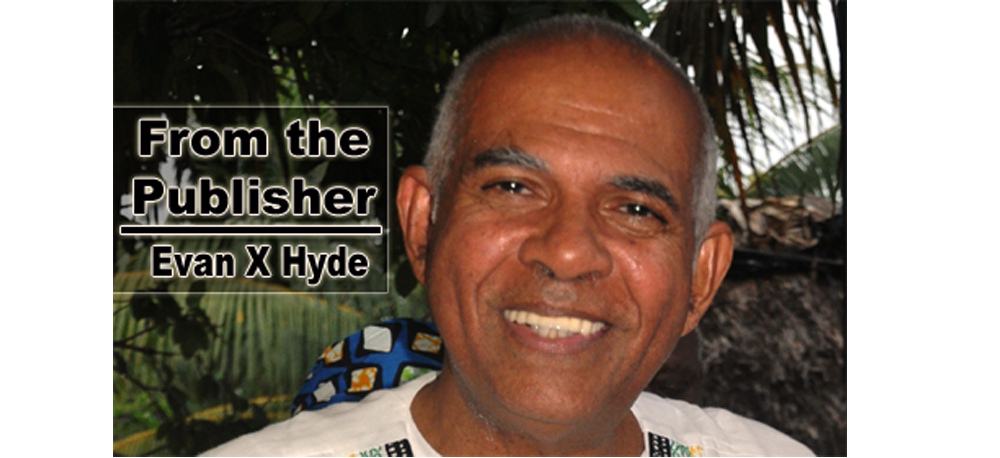Christmas was supposed to be a religious holiday, but the power structure, I guess worldwide, transformed it into a commercial extravaganza.
In Belize, roots people went along with the program because the Christmas holiday coincided with the return to Belize Town of all the men who had been working in the Cayo and Orange Walk forests. These men had been in the bush for five, six months, they had just been paid, and they wanted to let loose. Christmas became a bram.
I met it like this when I was a child. When it started, I don’t know. But things have changed somewhat, because the forests are no more.
The religious holiday of Christmas involved the birth of a Saviour child, who would be crucified when He became an adult in order to redeem us human beings from our sins. The Saviour child was the Son of God, but His mother was human.
When the Christ child became an adult, a descendant of King David of the Jewish people, he was crucified by the same people from whom He had sprung, the Jews, because they had originally thought He was the Messiah who had been prophesied to liberate them from the Roman Empire, which ruled Judea. Disappointed that Christ’s kingdom “was not of this world,” they told the Roman governor, Pontius Pilate, that they preferred for the brigand Barabbas to be freed, instead of the meek and gentle Christ.
Who actually gave the order for Jesus to be crucified? It seems that Pilate dodged responsibility for the order, and that the leaders of the Jewish people were blamed by the early Christians.
The Roman Catholic Church was established around the fourth century, at the Council of Nicea in Constantinople, and it spread all over the European and Eastern European world. A challenge to Roman Catholic hegemony came from Islam, led by the Prophet Muhammad, in the seventh century in an area now referred to as the Middle East.
Then in the sixteenth century a challenge to the Roman Church and the Pope of Rome arose in Europe itself, first in Germany with a monk named Martin Luther, followed by England, where King Henry VIII retained almost all the rituals and ceremonies of the Roman Catholic Church, but declared himself and his successors the leaders of this new Church of England, instead of the Pope.
Two brothers, John and Charles Wesley, later led a rebellion against the Church of England, and they established the Methodist Church, which, it seems to me, is quite powerful in the British Caribbean. In the United States, there is an Ethiopian Methodist Church, which is black-conscious.
Then there are the Baptists, who comprise the majority of African-American religious practitioners. That is how it appears to me. African-American Baptist churches are very musical in their worship, and they include dance.
The Roman Catholic Church was staid and stiff in its rituals, which were all using the Latin language until the coming of Pope John XIII in the later 1950s/ early 1960s.
Now the vast majority of Belizean practise some Christian religion or the other. So-called Evangelical churches have emerged in our region which are more soulful and roots than the Catholics and the Anglicans.
The bottom line is that all the Christian churches rely on writings which are referred to as the Holy Bible. Islam relies on the Koran, ascribed to the Prophet Muhammad, whereas the Holy Bible, which has an Old Testament and a New Testament, was written by many evangelists, some before the time of Christ, and others who wrote after Christ had been crucified.
There is a question about how areas of Africa fit into the Christian narrative, because, for example, the Old Testament Jewish leader/prophet Moses married an Ethiopian woman, the Jewish King Solomon had a relationship with the Queen of Africa, Sheba, and Jesus Christ Himself spent his first twelve years in Egypt, which was an African kingdom and the country from which Christ apparently gained a great deal of His insights and wisdom.
Islam became very powerful in parts of Africa, especially East Africa, but there are areas of Africa, especially in central and south Africa, where neither Christianity or Islam dominate the religious practices of the people. The problem for Belizeans is that we know nothing of our ancestors’ religions before slavery was imposed on us by the Europeans, and it is an undeniable fact that slavery imposed by the Europeans came inextricably tied to Christianity.
Today then, to be a blindly devoted Christian, to my mind, involves some kind of compromise with European slavery. Blindly devoted Christians totally reject any religious beliefs which are African in origin. It is only the Garifuna people who have made a breakthrough in the sense that they have forced the leaders of Christianity in Belize to accept major aspects of the religious beliefs they brought from St. Vincent, religious beliefs which you may describe as Indigenous and/or you may describe as African. But for sure, those religious beliefs are not European.
Power to the people.

